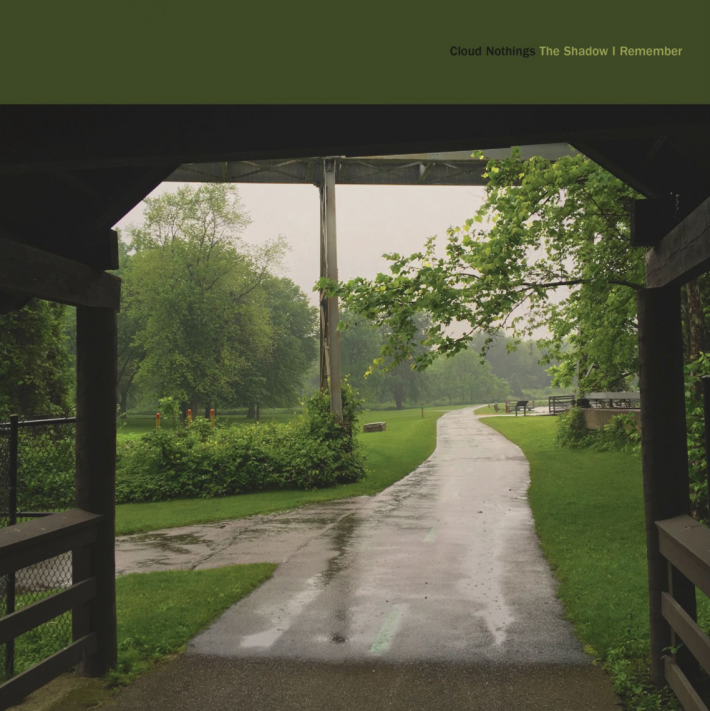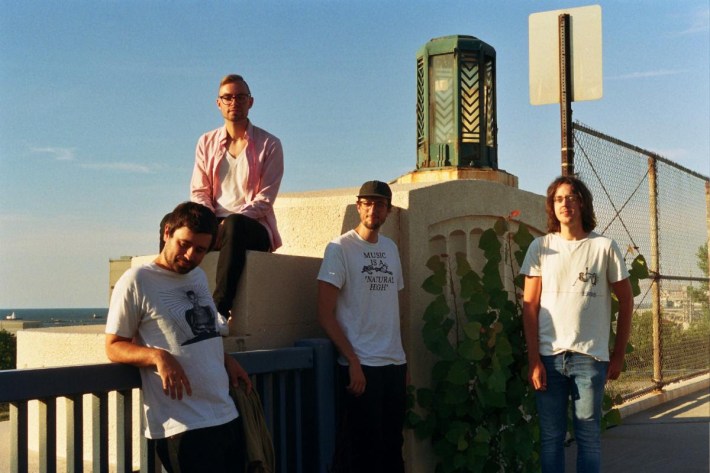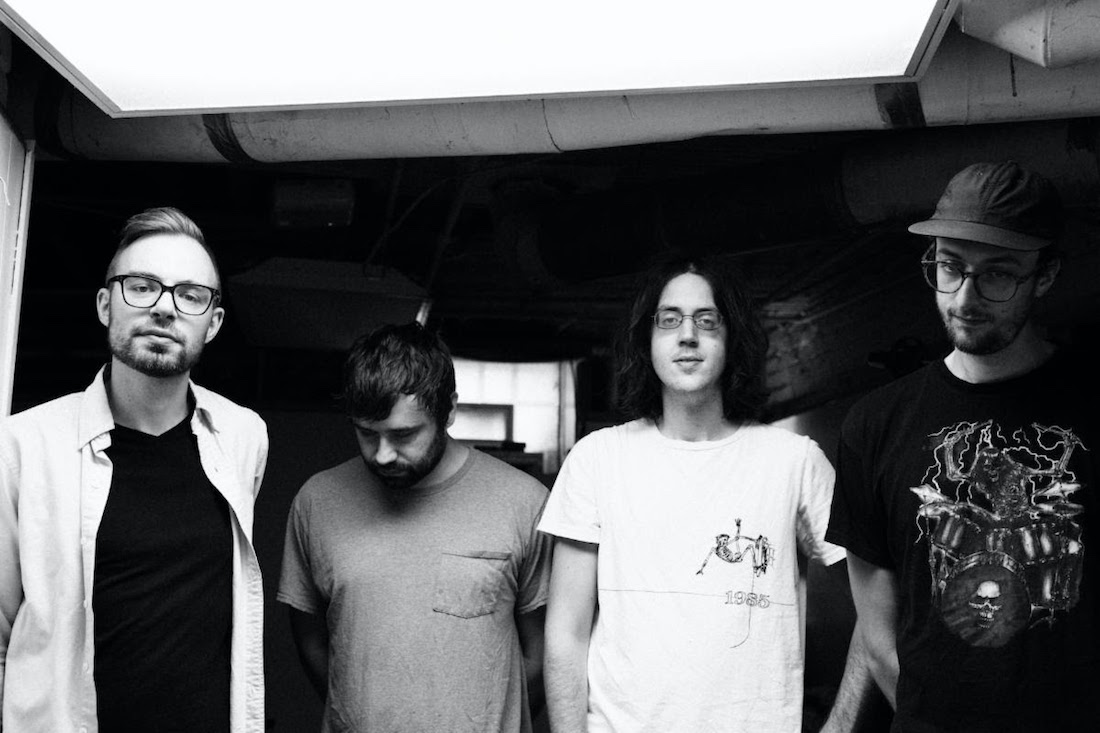With his band's new album and subscription series, Dylan Baldi is staying prolific during the pandemic
Cloud Nothings is the only type of nothing that Dylan Baldi can handle. But a whole lot of nothing was nonetheless forced upon the prolific musician last year.
Baldi is the guitarist and frontman for one of our finest young Indie-Rock-with-an-emphatic-capital-R bands. He built Cloud Nothings from a promising teenage solo project into one of the most reliably great units in underground music. They established that reputation by going full speed ahead for a decade-plus, routinely cranking out catchy guitar songs with a jolt of punk aggression. But like so much of this world's busyness, COVID-19 brought that lifestyle to a halt.
Baldi doesn't remember much about the first month of the pandemic. He knows he kept checking Reddit for news about coronavirus. He and his girlfriend began marathoning Curb Your Enthusiasm and cooking a lot more often. And... that's about it. "I didn't really get a whole lot done in the first month," he says. "I kind of just melted into the ether."
A month before everyone was forced inside, Cloud Nothings completed The Shadow I Remember. At the time, Baldi thought it would be the seventh Cloud Nothings album. It's now the ninth. (Things have gotten weird.) Their record label, Carpark, had already filled out its release schedule for 2020, so the album wouldn't have been out in 2020 no matter what. But Baldi hoped to be able to tour, at least. Besides writing and recording music, performing it live is pretty much the other thing he's always doing. And then he couldn't even do that.
"I was just bored pretty much immediately. What am I supposed to do?" he remembers thinking. He'd long been in the practice of "making a song or something pretty much every day." So after enough semi-dazed Larry David binges and browser refreshes, he "got into the swing of things with a homemade work schedule."
Baldi had moved to Philadelphia to live with his girlfriend, Sadie Dupuis of Speedy Ortiz (they now have an adorable dog named Lavender). The rest of his bandmates -- bassist TJ Duke, drummer Jayson Gerycz, and guitarist Chris Brown -- stayed behind in Cleveland, so getting everyone into the same room to make music together wasn't going to be an option for a long time. But he had experience working by himself.
Back in 2009 and in between classes at a music college he never fit in at, Baldi began posting bedroom recordings to a series of MySpace pages for entirely theoretical bands. As humble and scratchy as they were, the songs revealed a songwriter that already knew his way around a hook, and word began to spread through the indie-rock underground. The famed DIY promoter Todd P. discovered the page Baldi had made for Cloud Nothings and invited him to open for Woods and Real Estate at the Market Hotel. Baldi subsequently dropped out of college and hit the road, spending several years playing to almost no one. But eventually, people starters showing up. He hit it hard for a decade, dropping a few classic albums and touring ceaselessly, building Cloud Nothings into an indie rock institution. He hadn't slowed down until the world forced him to take a beat.
"I don't like feeling trapped or that I have nothing to do," he says from Philadelphia. "It's just not what I wanted out of life, but it was forced onto everyone."
Baldi's options were that he could either get to work, or he could get back to beating himself up. The latter is a bit of an ongoing lyrical preoccupation. The Cloud Nothings catalog is filled with songs, such as "Wasted Days" and "Stay Useless,” wherein Baldi castigates himself for not doing enough, not being enough, not living up to his own self-imposed idea of accomplishment. It's not a difficult thematic vein for him to tap into. "I just waste time, and then I get bummed out about how much time I wasted," he says of the periods when he doesn't have anything to work on. "And then it's just, there's an endless cycle of despair. I get nothing done. So it's nice to have a goal, at least."
As his unwelcome stasis grew on, it became clear that in order to move forward, he was going to have to make a half-return to his solo roots. He began sending songs for Gerycz, who he calls "probably my best friend at this point." They passed audio files back and forth, Gerycz adding drums, Baldi adding everything else. "Eventually, we just started stockpiling all these songs," he says. Baldi decided to self-release a set of them on Bandcamp as The Black Hole Understands, which ended up becoming the seventh Cloud Nothings album. (His label was fine with it. He thinks. He actually hasn't asked.) That the album appeared out of nowhere in a bleak summer was a welcome surprise. So was the album's sound.
After releasing debut album Turning On (recently reissued for its 10th anniversary) and a self-titled full-length within months of each other in 2010 and 2011, Baldi rechristened Cloud Nothings as a full-fledged band with 2012's acclaimed breakthrough Attack On Memory. Recorded by underground legend Steve Albini, the album found Baldi's knack for pop melodies and insightful angst sharpened like broken glass, delivered with a pulverizing, often scalding noise-punk fury. While Cloud Nothings would occasionally clean it up a bit, Memory made it clear that this band's music would primarily trade on visceral impact. Subsequent releases would confirm this impression. But The Black Hole Understands had a lovely, jangly pop feel that brought to mind Teenage Fanclub or early R.E.M., and served as welcome balm for his fans' frazzled nerves.
"When I am alone and writing songs, essentially just for myself, that's what this feels like," he says of the lighter touch of The Black Hole. "I don't really make the heavy stuff unless I'm playing with other people and it lends itself to that. Being totally alone, it's kind of hard to get in the headspace of 'I'm going to scream'." Gerycz adds, "I know it affected how I played because I like to push and pull the tempo and that isn't an option recording remotely to a click track. All of the jammy things we like to do, we kind of avoided doing because that involves playing off of one another and we need to be in the same room for that."
The making of The Black Hole Understands was Baldi's way of dealing "with the uncertainty of everything happening," he says, "because in the early days, it really felt like nobody knew what was going on, and today, it's not that much clearer." He needed creative time during the day where he could say, "I'm going to try to not think about everything else happening, because that'll make me into a bonafide crazy person. I need this thing to maintain sanity."

His expectations were measured. He mentioned the album on Twitter, but thought it would be a low-key affair. "But then it kind of got its own little press cycle going naturally, for whatever reason. It kind of took off in a little way, doing a lot more than I thought it would."
It probably helped, he acknowledges, that last year was a bit of a turning point in the public perception of Bandcamp. With its Bandcamp Fridays initiative, the online music retailer began waiving its revenue share on the first Friday of every month as a way to support artists hurt by the suspension of touring. After posting the album, he then noticed that the site had a subscription service. Might as well keep going, he thought. "Looking back, I have felt like when I was working at the highest level was when I was constantly making stuff."
Starting in September, Cloud Nothings launched a subscription series where fans got a brand new four-song EP every month, as well as the bonus album Life Is Only One Event, composed of songs made during the Black Hole sessions. "Eventually, it kind of like dawned on me that I like all these other 10 songs. The people who subscribe are clearly some of the biggest fans of the band," he says. "So it feels nice to give them an extra thing that they'll definitely like if they like the band."
Along the way, Baldi also released a "super lo-fi sounding" solo album, Enemy At Home. "It sounds terrible. And still, people are like, 'These are some of the best songs you've ever written.'” He and Gerycz dropped two albums of instrumental, improv-based compositions (averaging 10 minutes a suite) as the Baldi/Gerycz Duo, that pointed back to his days playing saxophone in a high school jazz cover band. "We did this thing that in no way puts us on the level of a lot of the people who I respect who make this kind of music. But it's fun because we have some records that prove we did this thing. So it's a selfish endeavor." He also recorded a "cover" of Green Day's "American Idiot" that this website found unsuitable for our Save Stereogum fundraiser. ("I thought it was funny. I didn't realize so many people were going to be making very dead serious covers.")
"He's always growing as a songwriter, challenging himself and trying new things," says Gerycz. "I think we've all grown through all of this. Honestly, the EPs feel like a return to form for Dylan, because he's always been so prolific and now we could release a bunch of songs through the subscription and it's all fun."
Even leaving aside the more outré detours, the run of songs Cloud Nothings released last year demonstrated his range as a songwriter. The December EP is a strange endeavor with songs inspired by his favorite video game Ori And The Will Of The Wisps (the entire subscription series might be worth it for "Beating The Spider") and the February drop finds a welcome return to aggressive screaming because, per Baldi, "I stopped caring about my neighbors."
It's freeing, he says, to be able to just release music without having to worry about making a big statement, and to know that it will be heard by a dedicated audience. His subscribers, he thinks, "are those people who would go to the record store. They have that deep 'I need to own this thing' kind of level," he says. "It's nice to be able to give them something extra that isn't on Spotify. Those people, they deserve some kind of reward for being so into music."
Last year Spotify founder and CEO Daniel Ek drew the ire of the music community by suggesting that artists needed to start releasing music more constantly in order to sustain themselves. Baldi finds it amusing that he's been able to sustain himself recently by following Ek's advice, but not using his platform ("If you use this service to do that, it doesn't really pan out that well") while adopting the constant release schedule that's associated more with hip-hop artists rather than rock bands.
The subscription model has allowed Baldi to keep his head above water while touring has been suspended. He also admits that while Cloud Nothings is still a live draw, "the band was at a certain peak a few years ago. And it's not like it's been like a massive drop since then or something. But there was a noticeable dip in crowd size," he says. "It does fade for everyone. It's just kind of a natural thing. But we were able to sustain ourselves through touring. I mean, we're doing fine."
Cloud Nothings are the sort of trend-averse act that, with very few stylistic modifications, could have thrived, at least on a subcultural level, in nearly any point over the past few decades. They don't serve as a shorthand for a scene, era, or sound, and both their consistency and their Midwestern unflashiness make it easy to take them for granted. After garnering widespread praise and mainstream attention with Attack On Memory and the 2014 follow-up Here And Nowhere Else, Baldi noticed the drop off after the positive if muted response to their more polished 2017 album Life Without Sound -- "a more muted record," he notes. "That's when people think we fell off or something. But even in retrospect, I know people, that's their favorite record." Despite the return to a higher-intensity sound on 2018's Last Building Burning, the respectful-if-not rapturous response to the album affirmed the sense that Cloud Nothings’ moment as a buzz band was over.
But the nice thing about constantly working is that you don't have to get too caught up in the reception to any particular release, "especially when you're always onto the next thing," he says. In this case, that next thing happens to be The Shadow I Remember, even if it was completed a year ago. "The timeline is all warped," Baldi concedes. The band reunited with Albini at his famed Electrical Audio studio, cutting the album in six days. "We just wanted to sound like ourselves, and for some reason, people have trouble with it," Baldi says. "But he is really good at it."
There's no need to consider the album a comeback for a band that doesn't need one, but whatever it is you might look to Cloud Nothings for, you'll find it on Shadow. Their single "The Spirit Of" starts off as a briskly melodic lilt, before unleashing the band's signature cathartic swell, and elsewhere there's plenty of the feedback scarred riffage you hire Steve Albini for. But the album finds time for "Nara," which Baldi thinks is probably the softest tune he's ever written, and "Nothing Without You," which you can view as a sweet, New Wave-y love song or a denunciation of feeling codependent, depending on which of Baldi's two interpretations you prefer. "It's funny that some people might think we're just some little soft band and some people think we're some big aggressive band," he says, "when in reality, I think we're somewhere in the middle."
Baldi has a tendency to get to his passing-of-time-related crisis of confidence a few years ahead of schedule, attacking himself for not living up to his potential on Attack On Memory when he wasn't old enough to drink legally. Now at the ripe old age of 29, he opens his latest album by asking, "Am I older now/ Or just another age?" Later he spends "Am I Something" wondering if his life's work, not to mention his life, matters to anyone at all. "I've always felt like I was like a little old man in a young baby body, and the old, balding, man is slowly turning into my outer physical presence," he says. "So the songs that are related to time and aging, that's because that's just always on my mind."

But elsewhere on Shadow, he finds comfort in the hard-won knowledge that if you can't fight the passage of time, you can hopefully find moments of self-acceptance and joy along the way. It's all any of us can ask for. He's a bit better at admitting that, in between self-flagellations, he needs those grace moments as well. "I guess it does feel more comfortable to express more than whatever the one emotion is. A lot of the old stuff is very bleak. In a way, a lot of the records feel grey to me," he says. "And this one, even the cover of the album...there is some green down there, some blue."
He's probably still a bit too young to be considered a rock 'n' roll lifer, but Baldi has a startling tendency to reach age-related goalposts well ahead of schedule. But one day, his concerns about growing older and obsolete will, inevitably, link up with the dreaded reality of actually being old. By that point, God willing, the Cloud Nothings catalog will be quite robust. But when the natural equilibrium is finally achieved, he nonetheless promises that we'll all really be in for something. "Yeah, I'll get there," he says of actual old age. "And then I'll write a really wild record."
But he’s decided that for now, he has so much to do while he’s still young. By time you're reading this, Baldi will probably be working on another song. The die-hard subscribers should know that there's tons more coming their way. He’s doing what he can with what he has. No one gets to stop time. Few of us get to stop the nagging self-doubt. But if you're lucky, you get to spend your days trying to make that time count for something.
"I've always wanted to do this. I remember even telling people when I was a little kid that I want to be in a band and play music. So once it became something that I was actually doing, it's hard to envision another life," he says. "So the way to keep doing it, I feel like, is to work constantly. To stop doing it would feel like stopping a significant chunk of my life at this point."

The Shadow I Remember is out 2/26 on Carpark.






